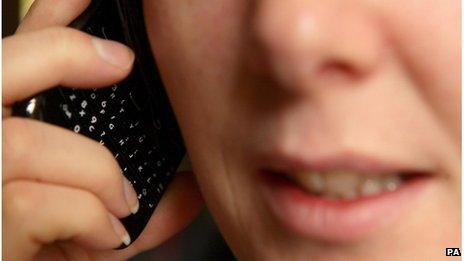Scottish referendum: UK government claims phone charges could rise
- Published

The Scottish government say the EU will soon limit roaming charges
The UK government is to claim that Scottish independence would leave mobile phone users facing higher bills.
In its latest paper on the 2014 referendum, it raises the possibility of Scottish callers facing roaming fees when they visit England.
The paper also claims independence could threaten postal services and rural broadband provision.
The Scottish government has pointed out that EU rules mean roaming charges will fall from Monday.
The paper drawn up in Westminster will claim that, after independence, Scottish mobile users travelling to the rest of the UK would be charged a premium for making calls "abroad".
It warns that people close to the border could inadvertently incur these charges if their mobile phone connected to a mast on the English side.
The paper also suggests the "world class services and economies of scale" of the post office could be put at risk and claims there might be less money to roll out high speed internet services for smaller communities.
'Less choice'
UK Consumer Minister Jo Swinson said: "The UK's integrated infrastructure connects people and communities, creates jobs and supports trade.
"The government is committed to maintaining world class postal and broadband services. This includes continuation of a six-day-a-week postal delivery service and the provision of broadband to rural areas."
She added: "If Scotland left the UK, posting a letter or making a call could cost more - and there could be less choice for customers."
The Scottish government dismissed the claims and said successive Westminster governments had "substantially weakened" Scotland's communications infrastructure.
Independence 'opportunity'
A spokeswoman said: "Since 2002, more than 400 Scottish post offices have closed and plans for privatisation of Royal Mail threatens jobs and the operation of the universal service obligation whilst people across rural Scotland regularly struggle with the lack of mobile phone coverage as the current system fails to deliver for Scotland.
"Independence will provide an opportunity to properly support the postal network with access to our fair share of UK assets."
On mobile phone charges, she added: "The UK government should acknowledge that the EU is looking to remove roaming charges completely and they are widely expected to be abolished well before 2016."
A senior Tory MSP described the claim that mobile phone bills could rise under Scottish independence as "silly".
Reacting on social networking site Twitter, Scottish Conservatives deputy leader Jackson Carlaw wrote: "Some of the arguments against #indy are becoming a bit silly."
Clarifying that he was referring to the mobile phone warning, he also urged the pro-union camp to "win playing at the highest level".